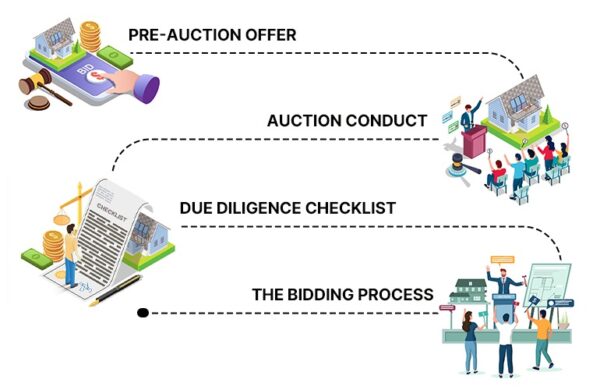Before we understand the workings of an auction, it helps to understand what exactly a real estate auction is. A real estate auction is the selling of a piece of property which is hosted by an auctioneer, within a specified regime.
Essentially, the auction will be informed to all for a particular place, date, and day. Any of the interested purchasers may offer to bid on the highest price possible for the given property.
Before the auction officially begins, the participants are given a final look at the property, while they ensure they have their documentation and paperwork ready for the bidding. The terms applied to the bid are non-negotiable.
Listed below are some of the terms to know and understand in an auction.

Pre-Auction Offer
A pre-auction offer is a situation where the seller allows you to make an offer before the actual auction begins. The process of the contract remains the same as a regular transaction for property. If the offer for the contract is allowed within three days of the official date for the auction, it will be a permanent commitment and non-negotiable.
Auction Conduct
An auction runs in a very particular manner with certain procedures that aren’t compromised. It is helpful to know these beforehand. Before the bidding begins, the auctioneer will inform the bidders of certain rules to follow. Here are some prominent ones to keep in mind:
- The rules of the auction should be followed carefully
- If anyone were to engage in any unethical bidding behaviour, they would be fined for it
- The auctioneer will confirm the status of the vendor; whether there will be a single vendor or co-owner bids
- Any kind of disturbance made during the auction would be met with severe fines
- Raising any kind of false bids is deemed illegal
- Once the hammer is dropped, any number of bid requests will be denied
- The bidders will be identified only at their request
Due Diligence Checklist
The due diligence checklist is an important addition. All those interested in selling need to carry this with them, as it enables buyers’ inspections. This list is made to help the respective purchasers find anything that may or may not support their decision to continue purchasing an item.
The Bidding Process
The process starts with the auctioneer setting an amount for the bid. These bids can value higher than the base price, known as rises. The bidders may offer their alternative prices as a rise, which the auctioneer can choose to accept or not. The auctioneer has power over the bidding process, and this requires them to carry out certain activities:
- They can refuse a bid at any time during the auction
- They are also allowed to resume the auction at the last undisputed bid or start the bidding again
- Auctioneers can also offer/refer a bid to a seller and withdraw the same from the sale according to their preference
Top Tips for Purchasing Property at an Auction
Buying property can be confusing if you are lacking in experience or are venturing without any expertise. While we recommend having a strong seasoned body checking on your activities,
Here are some things you must keep in mind when you go purchasing a property.
Have Details of the Property
Understand the prices of what you’re interested in. The face value isn’t enough. There are intricate details in each sale, and it is your responsibility to spend time and understand it all. A common method to tackle this problem is understanding the area and the prices of similar properties in that area.


Keep Confidential Information Safe
Bidding and property information is extremely important, so it is necessary that you keep this information with you safely. If you plan on working with an agent, ensure you’ve done a background check and are trusting your credentials in safe hands. During the bid, ensure you aren’t giving the other side more information than they require. Bidding is a highly mental game, and it is important to stay secure.
Start Your Bidding Low and Early
A golden rule, starting low and early will ensure that you are in more control of the situation compared to chiming in later.


Take Your Time
There is no competition for time here. It is important that you spend time genuinely evaluating your choices available and plan your next move accordingly. Spending time helps apply pressure on the seller as well. As a tip, it may help to set your upper price limit around the range of the valuation price of the property.
Be Strong and Focused Mentally
Be confident when you speak up. Call your numbers with surety. Follow the old pattern and call out your numbers in whole amounts.


Use Rounded Numbers for Your Bids
Call your bids in whole numbers. Calling something ending with “zero” helps ensure that there is no remaining amount that an opposing bidder can add on. If they have to bid after this, it will have to be a larger number.
If you are planning to buy a property through an auction or auction off your property, you will need to deal with a lot of paperwork and abide by the regulations. SD Conveyancing has experience in this field. We have a team of conveyancers who can help you with property auctions. Call us for more information.







